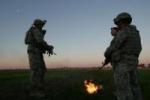Hey Steve--
Good point/post. Back in 86 - 87 we (Max, me, and others in SWORD) were trying to define what COIN success in El Salvador would look like. None of us thought that it would end with a peace accord that gave the government nearly everything it wanted.So, we thought that success would probably be when the threat was down to the level of a police problem. That is, it would be essentially banditry that would not require the army to address. At most, the AF would have to provide some helicopter mobility and the navy would need to exercise its coast guard function.
Cheers
JohnT







 Their new superbike looks to be pretty interesting but the k1200rs (practical, comfortable, and wicked fast) that I test rode a few years back still haunts me, one of these days I will have to do something about that.
Their new superbike looks to be pretty interesting but the k1200rs (practical, comfortable, and wicked fast) that I test rode a few years back still haunts me, one of these days I will have to do something about that. 







Bookmarks